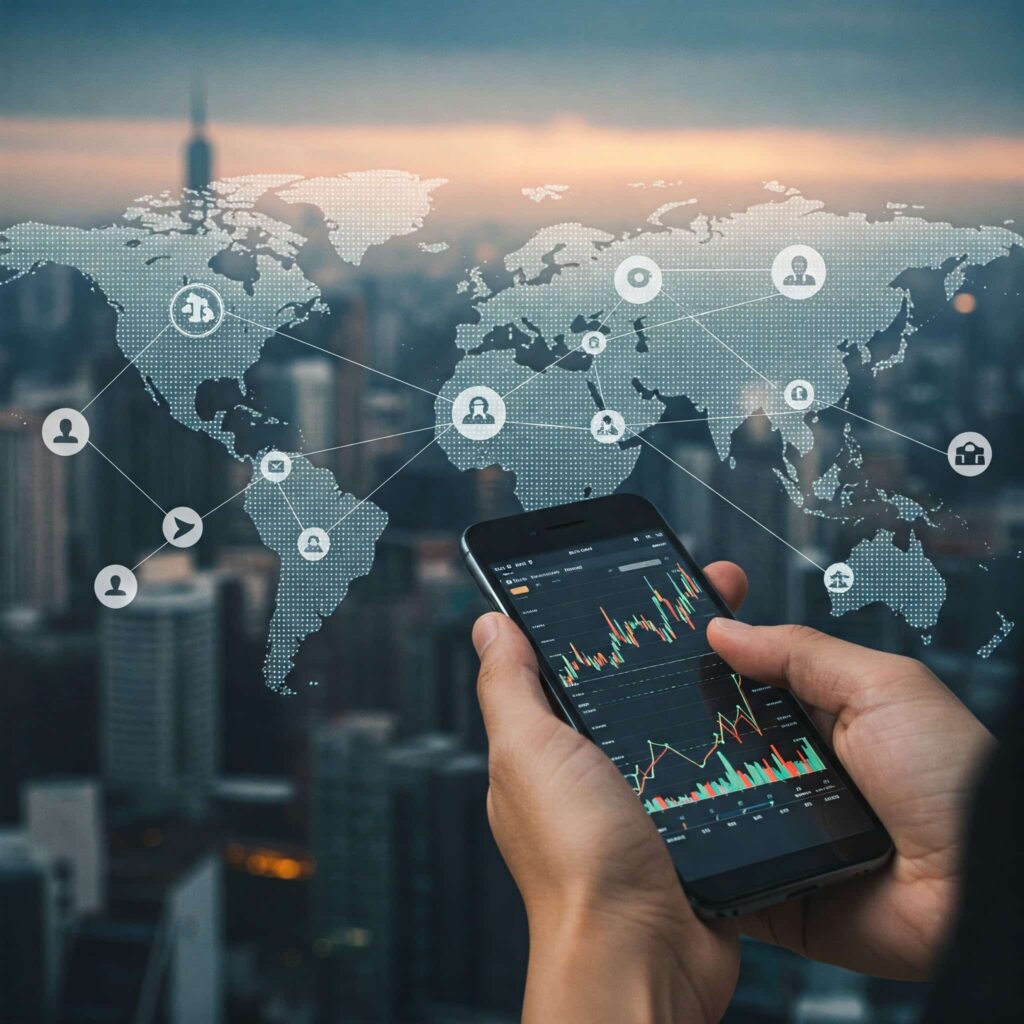How Changes to the World Economy Affect Your Finances
Changes in the global economy have a ripple effect that can extend to the wallets and bank accounts of average people. The phrase “global economy” may feel high-flying and theoretical, but the rhythms of the global economy affect everything from what we pay at the grocery store to what we earn on our savings accounts. Understanding these changes — and knowing how to prepare for them — can have a large impact on individual financial health. In this article, we will explore the forces reshaping our world economy, dig into the ways it impacts personal finance, and present concrete suggestions on how to adapt and be successful.
Interpreting International Economic Transitions
1.1 Understanding Global Economic Transformations
“Global economic shift: A major change in the international economic environment, which alters factors such as global trade flows, investment patterns and labour market dynamics. Such shifts may take the form of changes in global growth, in international trade, or in the global labor market. One example: The proliferation of automation and remote work can change the conditions for jobs and wages around the world.
1.2 Beyond the Post-Pandemic Recovery
Over the past few years, the world economy has changed dramatically behind different variables. Except for a few thousand business closures, many economies recovered after initial decline due to COVID-19 pandemic due to stimulus packages, monetary policies trying to increase consumer spending (Source: International Monetary Fund (IMF)); However, recovery has been uneven among regions due to factors such as disparities in vaccine distribution, supply chain bottlenecks and varying policy responses.
Emerging technologies, potential future pandemics, and geopolitical tensions will continue to impact future supply chains, which may lead to disruptions, inflationary pressures, and evolving (or even tightening) labor markets. Knowing about these changes helps people program their financial strategies more effectively.

Major Economic Indicators To Watch
2.1 GDP growth
GDP is the sum total of the monetary value of all the country’s goods/services. A growing gross domestic product (GDP) shows a healthy economy, which leads to more job opportunities and higher-paying salaries. By contrast, slow or negative GDP growth can indicate economic distress, which may trigger layoffs or decreased consumer spending.
2.2 Inflation
Inflation is the rate at which the overall level of prices of goods and services increases. When inflation is moderate and predictable, it is typically viewed as a manifestation of a growing economy. On the other hand, too much inflation can dilute purchasing power and your money buys you less and less over time. Developed economies monitoring moderate to excess inflation from this point onward (SourceOECD Inflation Data)
2.3 Interest Rates
Central banks set interest rates (such as the Federal Reserve in the U.S. or the European Central Bank in Eurozone) that drive lending to consumers and businesses, returns on savings and investments. Interest rates are the cost of borrowing money, and higher rates can cool economic activity by discouraging borrowing, while lower rates typically encourage spending and investment.
2.4 Currency Exchange Rates
Currency exchange rates influence some prices of imported and exported goods. A strong currency can also lead to cheaper imports but less competitive exports, with the potential to affect jobs in some industries. And for individuals, currency fluctuations are a big deal if you travel abroad, invest overseas or send money back home to family in other countries.
Effects on Personal Finances
3.1 Employment and Income
Jobs can change due to global economic shifts Automation and artificial intelligence, for example, can eliminate some jobs while generating demand for others, such as data science and software engineering. And globalization has linked labour markets across the globe, so that economic developments in a region can impact job prospects thousands of miles away.
Actionable Tip: Remain flexible and continue learning new things. These online learning platforms offer courses that help you up skill and transition into more in-demand careers.
3.2 Cost of Living
When global inflation picks up, so typically does the cost of living. Housing, food and transportation are some essentials that can get more expensive. Supply chain disruptions, perhaps most notably seen during the COVID-19 pandemic, can specifically increase the price of both domestic and foreign goods, affecting household budgets.
Actionable Tip: You may also want to create a detailed budget that factors in rising prices. Log what you spend and find opportunities for you to cut back or replace for less.
3.3 Savings and Investments
Changes to global interest rates and stock market performance can have a huge impact on the returns you’ll see on your savings and investments. In a high-interest-rate environment, savings accounts and bonds might provide better returns but also increase borrowing costs. For its part, equity markets may see increased volatility as investors react to uncertain trade policies, inflation data and corporate earnings.
Key takeaway: Diversify your portfolio. Diversify across asset classes (stocks, bonds, and even alternatives, such as real estate or commodities) that can help soften the blow during periods of market volatility.
3.4 Debt Management
As interest rates climb, the cost of servicing debt — mortgages, student loans, credit card balances — also rises. That can add pressure to household budgets, particularly for variable-rate loans.
Actionable Salary Tip: If you have out of control high-interest debt, refinancing or consolidating your loans when rates are low could save you a ton of money. So be sure to shop around for competitive rates.
How to Protect Your Personal Finances
4.1 Build an Emergency Fund
The simplest yet most impactful tool for protecting personal finances is an emergency fund. Many financial advisers recommend putting away three to six months of your expenses in a liquid, low-risk account (Source: Consumer Financial Protection Bureau). This cushion will allow you to weather job losses, medical emergencies, and unexpected repairs without going into high-interest debt.
Assess Your Budget and Lifestyle Again →
Being on top of your budget can help insulate you from economic volatility. If the world gets more expensive, adjust your budget and your spending, looking for areas where you can scale back or find a less expensive option — whether that means fewer meals out or a cheaper cell phone plan.
4.3 Keep Up to Date With the State of the Economy
Using reputable economic newsletters or financial news outlets that alert you to changes may help keep you on top of shifts that could impact your finances. Government publications — like those from the Federal Reserve (in the U.S.) or the Bank of England (in the U.K.) — regularly feature easily understood reports on key economic indicators such as inflation and employment.
4.4 Diversify Income Streams
The global economy is constantly changing, which can put you at risk if you rely on a single source of income. Think about freelancing, opening a side business, or investing in income-generating assets such as dividend-paying stocks or rental properties. Having multiple sources of income can help you balance your finances when one of them disappears.
Real-World Examples
5.1 The 2008 Financial Crisis
The 2008 crisis, which was set off mostly by the collapse of the U.S. housing market, rippled around the world. Millions lost jobs and stock markets crashed, eroding retirement savings and investment portfolios. Governments worldwide stepped in, providing bailouts and stimulus packages, a striking reminder of just how interconnected global markets have become.
Get The Lesson Learned: Despite uncertainty in our markets, we can be resilient by maintaining a diversified portfolio and having an adequate emergency fund.
5.2 Supply Chain Disruptions Due to COVID-19
Starting in 2020, the COVID-19 pandemic resulted in lockdowns and decreased labor capacity around the world, disrupting supply chains and leading to shortages in areas including electronics and autos. Prices for some items soared, fueling inflation in many countries.
Lesson Learned: Shutdowns can lead to inflationary pressures and supply shortages. Buying well in advance and having the option of flexible sourcing can help individuals and small businesses weather future disruptions of this type.
5.3 Rapid Technological Evolution
The demand for e-commerce and remote work has transformed many jobs, increasing the evaluation of digital skills. These days, companies hire from this global talent pool, bringing about competitive pressures but also opening up remote work opportunities to those in other regions.
Takeaway: To compete in the new marketplace, you must continue to develop your skills and/ or embrace freelance or work-from-home opportunities.
Concluding Thoughts
The world’s economic changes are no mere front page story in the financial press; they are the hand that dictates the daily lives of employment and prices, even how we earn and spend money. In order to get ahead of the game you have to stay alert and adjust your finances accordingly. Simple steps — building an emergency fund, diversifying your income and investments, and continually upgrading your skills — can help you stay resilient, no matter which way the economic winds blow.
Whether it’s tracking the interest rates controlled by the Federal Reserve, tracking inflation data or paying attention to how the global labor force is changing, being aware of macroeconomic trends is an integral part of modern personal finance. However, if you put in the effort and use the right strategies, you can embrace these changes more confidently and stay in control of your financial future.
Disclaimer: The content of this article is for informational purposes only and should not be considered as financial advice. This advice is general in nature and may not apply to your particular financial situation, so be sure to check with a qualified professional. A wealth of information with references to the International Monetary Fund (IMF), the Organisation for Economic Co-operation and Development (OECD), and the Consumer Financial Protection Bureau (CFPB)



